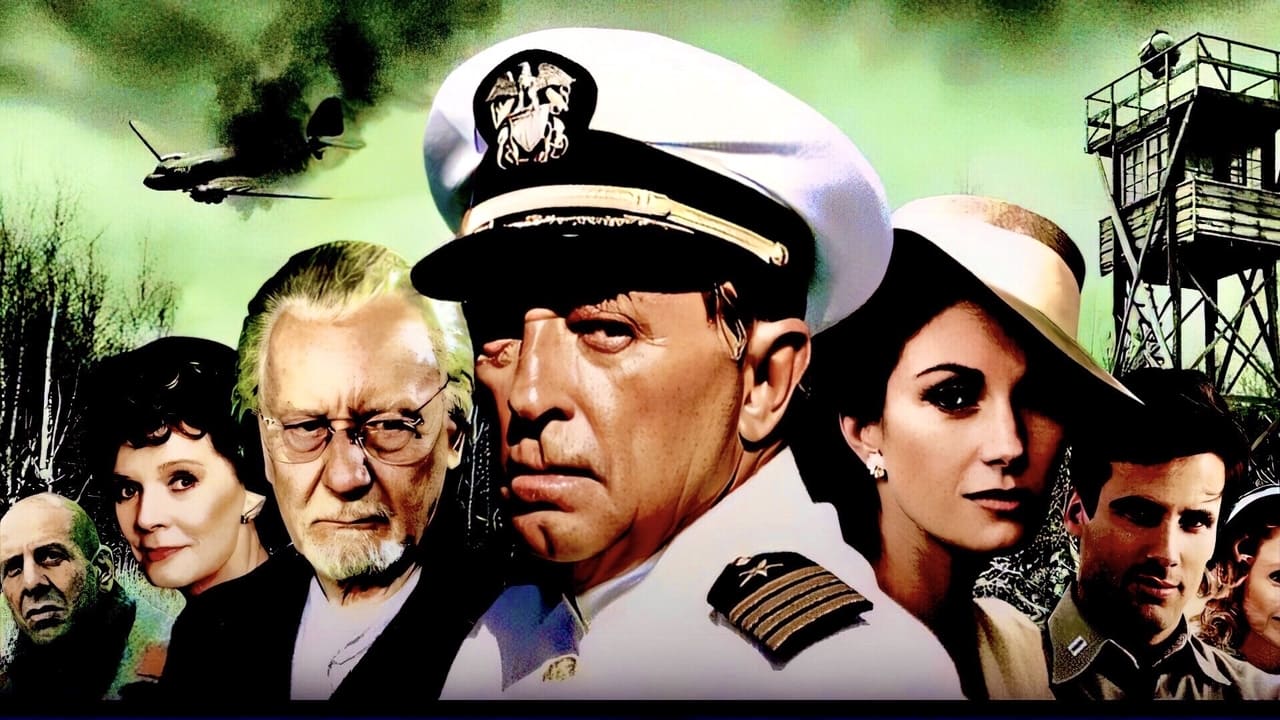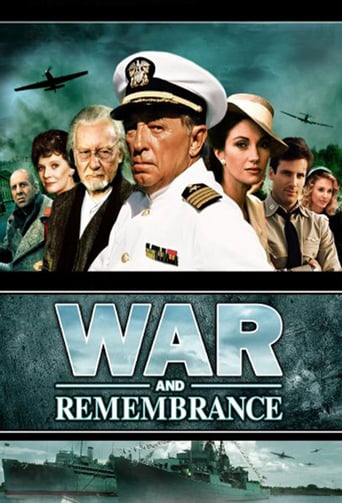

Be forewarned, War and Remembrance leaves little to the imagination. Due to the subject matter, this is a hard series to watch about one of the most disturbing events in world history, the Nazi death camps of world war two. Atrocities committed by mankind that should never happen but have and probably will again. War is to be expected but the murder of millions can never be justified by a civilized people. This series is a stark reminder that the depravity of mankind has no limits. This is the best reenactment of some of our darkest days. Remembrance, is a good name for it. Very well done and I highly recommend seeing it.
... View MoreHerman Wouk's succeeding epic to his The Winds Of War comes to the small screen as a splendid epic and an object lesson in what the mini-series is all about. War And Remembrance is big and sprawling with a lot of impressive spectacle, but the characters that Wouk created of the Henry and Jastrow families will live on for some time in your memory after seeing this film.In The Winds Of War we see the marriage of Robert Mitchum as naval captain Victor 'Pug' Henry and wife Polly Bergen start cracking at the foundation as Mitchum is charmed by British correspondent Victoria Tennant and Bergen first with Peter Graves and later with Michael Connors is becoming a rebound catch. It's the strain of separation with those high level assignments that career officer Mitchum gets in both of the series and the long separations.The Henrys have three children all caught up with the war effort. But Hart Bochner as younger son Byron has to fight his war in the Pacific with the anxiety of his wife and young son caught behind enemy lines. Bochner is married to Jewish Jane Seymour and their child's first years are spent as the Nazis overrun Europe.Why are they there and why doesn't she leave? She has family there particularly her aged uncle John Gielgud won't leave his life of scholarly comfort in Italy. Gielgud is a cultural Jew who cannot grasp the danger she's in. Seymour stays and tries to persuade him to go. Most who watch War And Remembrance are aware of the narrative of events in World War II and can appreciate how Gielgud consistently makes the wrong decisions every time. For younger viewers it will be a moving revelation.The twin themes of battlefield courage and the courage of the civilians in Europe are beautifully and tightly woven into alternative themes. The action in this film is global from the Pacific War to the plight of those specially chosen victims by Hitler for extinction. Before Steven Spielberg gave us Schindler's List the experience of the concentration camp is beautifully realized in War And Remembrance with Seymour and Gielgud and the rest around them. Ralph Bellamy and Robert Hardy who played Franklin D. Roosevelt and Winston Churchill in other projects bring a nice familiarity with the historical characters here. Steven Berkow is frightening as Adolph Hitler and Hardy Kruger is brilliant as the doomed Field Marshal Erwin Rommel.War And Remembrance and its predecessor The Winds Of War are great dramas both and invaluable historical tools for studying the World War II years.
... View MoreThe battles in the Pacific Theater of Operations are legendary in their scope and the fierce strategical maneuvering between American Naval forces and those of Imperial Japan are a cat and mouse game of epic proportions. The title of this much acclaimed mini-series would lead one to believe that it is, first and foremost, a re-telling of the Second World War. This monumental undertaking focuses our attention on one family whose involvement in that war is total and unfolds on both fronts, the War in Europe and the War on Japan. The premise would have been a "pip" had they made the characters more interesting and the acting less contained. For that we can thank the writers, one of which was the author of the novel and the director, who was also one of the writers of the screenplay. It would have also helped had the set director taken the time to realize that while Ralph Bellamy makes a wonderful F.D.R., as evidenced in his portrayal of the president in "Sunrise At Campobello" the photographs used of the real F.D.R. were not appropriate. They look nothing alike but Bellamy captured the absolute essence of the man who was our 32nd president in that film. I would be certain that he was chosen for this role as evidence of that portrayal. The actor portraying Adolph Hitler, Steven Berkoff, was not so fortunate and the same photographic error was made in that instance, however, Berkoff portrayed Hitler as a complete and utter madman from beginning to end which was so unrealistic as to border on the laughable. Only marginal attention was given to Admiral Isoroku Yamamoto, the mastermind behind Pearl Harbor and the Commander-in-Chief of the Combined Fleet of Japan. Japan's heavy losses at Midway literally turned the tide of the war, and the subsequent fall of Guadalcanal put Yamamoto on a collision course with death. His plane was shot down near Bouganville on April 18, 1943.In actuality, the story suffers at both ends of the spectrum despite its 12 hours of screen time. Add to that the runner up to War and Remembrance, "The Winds of War," and you have about 30 hours of viewing time. I should think 30 hours is enough to tell both stories in their entirety and yet, throughout the series I had a feeling of missed opportunities in characterizations, relationships and content. Despite some rather larger than life names on the marquee the actors don't seem to mesh in the way they could or should. My impression, knowing all the major and most minor players, is that the job was merely adequate. This cast should have been spectacular but they never really took off, as it were. Speaking of which, even the aerial sequences, most of which I had seen before due to their use in other films, were not used to their fullest advantage in the battle scenes. The characters were not developed fully and they should have been for a saga such as this with actors such as they had available. The pairing of Robert Mitchum, as Capt. Victor "Pug" Henry and the much younger Victoria Tennant as his paramour, Pamela Tudsbury, is all but laughable and the reasons do not lie in the age difference. One has to wonder what it is she actually sees in this man! Polly Bergen, as Rhoda Henry, "Pug" Henry's wife, is totally miscast as the woman who may lose this sea faring lonely-heart to a much younger, much more worldly and intelligent woman and yet she has her own dalliances and does little more than smile too much, travel too little and attend all too many functions! Robert Morley as Alistair Tudsbury and John Gielgud as Aaron Jastrow are worth their weight in gold. Both seasoned actors know how to get the very most from even a cameo appearance in any film. High marks also go to David Dukes as Leslie Slote, Barry Bostwick as "Lady" Aster, Robert Hardy as Winston Churchill and Ian McShane as Philip Rule. They took the best within themselves and used it well. Bill Wallis, as Werner Beck, gives an admirable portrayal of a former student of Aaron Jastrow who is sympathetic to the plight of this prominent "Jew" awaiting transport to Palestine via ship just as Germany invades Poland. He offers his protection and assistance to his much admired professor and convinces him to leave the guaranteed protection of this arranged sailing and go back to live in Italy, where Jastrow has a home. He and his niece, Natalie Jastrow Henry, who is married to Byron Henry, Captain Henry's son and played by the lovely Jane Seymour are completely taken in by this former student although Natalie suspects something is amiss.So many other recognizable names are in this cast that it reads as a veritable who's who of that eras actors with some great older names peppered in. I cannot tell you this is a complete waste of time or a series to by-pass but I am advising that you not expect too much. Based on other reviews I have seen here many are thrilled by its making! In the event you do have the opportunity to see it, I would suggest you first take another inordinate chunk of time to first view "The Winds of War." This will set up some of the characters for you so you don't feel you walked into the middle of something. There were 5 years that elapsed between the two undertakings and that is far too long to expect viewers to have been waiting with baited breath for a sequel. Both should stand alone as complete enactments of a story with total understanding for each character within it.
... View More.....of War" But as reasons, they cited production values centering on shooting locations, authentic sets, care in staging shots, and other technical aspects of production. No one said the very obvious: "Remembrance" is better than "Winds" because of the higher caliber of acting. Jane Seymour's nuanced portrayal of Natalie was certainly better than Ali McGraw's one-dimensional haughty, petulant and flibbertigibbet Natalie. Gielgud was more professorial and a really convincing intellectual Jew compared to Houseman. His delivery of that sermon on the biblical Job as a "stinking Jew" (an epithet Jews were required by the SS to use in introducing themselves in the concentration camps) was very moving. The noble but conflicted Byron characterization by Hart Bochner is certainly not the shallow hot in the pants Byron portrayed by Jan Michael Vincent. For some reason, I also preferred the Warren Henry of Michael Woods over that of Ben Murphy who wasn't bad at all but Woods had the charisma or the "glow about him" that Pamela Tudsbury (Victoria Tennant) described. Polly Bergen's acting or maybe her role as Rhoda much improved in "Remembrance" because in "Winds" she was just this overly excited and artificially cheerful navy housewife bowled over by the seeming glamor of Nazi Germany. Now in "Remembrance" she displays a fuller range of acting descending into regret and downright pathos as she realized that she flirted away her marriage and family. I realize I may not be being fair in blaming the actors named. For all we know, Herman Wouk's screen writing skills improved in the five-year interim between "Winds" and "Remembrance." Similarly, Curtis' directorial savvy may have also improved. And that brings me to the matter of comparison between the book and the screenplay. The film generally succeeds in bringing to the TV audience the gist of the story (stories actually) in "Remembrance," but actually it is not a faithful rendition of the book's narrative. Certain contrivances were used to bring key characters to interact with each other to get the audience into the flow of the epic. For example, in the film Pug and Armin von Roon were personally acquainted or even friends in a sort of way. But in the book they never met as far as I can recall. Admiral Henry was writing a memoir or a postwar analysis of the battles and the conduct of the war and was using a book written by Von Roon as a reference which he was refuting on several points. I was somewhat sympathetic to the Von Roon character in the book but still he was presented as somewhat of an opportunist who supported Hitler as long as he was winning the war and turned against him only when Germany was losing. In the film, however, Von Roon (excellently played by Jeremy Kemp) was shown to be an early critic of Hitler and hinted at as one of the plotters of the failed assassination of the Fuhrer.Your Edit Subject:
... View More